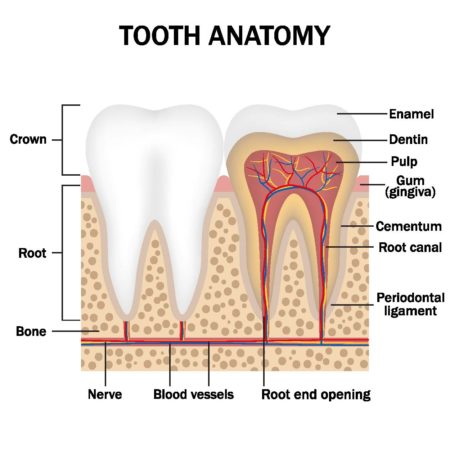Dr. Samuel Coppola is an endodontist at Endodontic Associates in southern Maine. He’s been doing root canals his entire professional life — more than 30 years. So, when someone asked Catching Health to explain what happens when you have a root canal, we turned to Dr. Coppola for the answers. He began by suggesting that instead of saying you need a root canal, dentists should use the term endodontic therapy.
“Though they refer to the same procedure,” he said, “I’d be willing to bet that your initial reaction would be quite different. Interestingly enough, studies have revealed that most people who responded negatively when asked about this dental procedure had never actually had one performed on them.”
Whichever term you prefer to use, Dr. Coppola answers some of the most frequent questions and concerns he gets from his patients about the procedure.
Why would someone need a root canal?
When a tooth develops a deep cavity (decay) or a crack or requires a large filling (restoration), there’s the potential that the pulp can become irritated. The result is inflammation and the eventual death of this tissue.
When this happens, the patient usually begins to experience sensitivity to cold and hot foods/liquids. As the inflammation progresses, there is prolonged pain with temperature stimulation and symptoms may also begin to occur spontaneously.
At this point, pain medication is required. Once the pulp tissue completely dies, an abscess may develop. An abscess is a localized infection in the bone at the end of the root(s) of the involved tooth. Symptoms that can occur range from throbbing to pain upon biting to swelling. In order to alleviate these symptoms, the diseased pulp tissue must be removed from the root canals and the space eventually sealed with a rubber-like material.
Will it hurt?
With all of the local anesthetic injection techniques available, the patient should not experience discomfort during this procedure. There may be some discomfort following the treatment that is usually managed with over the counter medication. In reality, it is the pain associated with the diseased pulp tissue that produces more discomfort than the actual procedure.
How does my tooth stay alive without a nerve?
The main function of the dental pulp is in the development/growth of a tooth. After that, it can be removed without compromising the life of the tooth. There are other nerves, blood vessels and connective tissue that are responsible for supporting the tooth in the jawbone.
How does my tooth stay in my jaw without roots?
Remember, it’s not the roots that are being removed during the procedure but the tissue within the canals.
If I have an abscess, why can’t we just treat it with antibiotics?
A dental abscess is an extension of the infected pulp into the bone surrounding the involved tooth. In order to get the abscess to heal completely, you must remove the source of the infection which is the diseased pulp tissue. Think of it like a splinter that causes a localized skin abscess.
Until the foreign body is removed, the abscess cannot heal. Antibiotics are frequently used to alleviate the initial symptoms and possible swelling associated with a dental abscess, however, endodontic therapy is required to definitively eliminate the infection.
Is my tooth going to turn dark?
Teeth would occasionally turn a darker color in the past as a result of either leaving pulp tissue in the crown portion of the root canal space or by using an amalgam filling material to seal the opening in the crown through which the procedure is performed. Neither of these should be of concern with present day techniques.
My friend had a root canal and still had to have the tooth extracted. Will I?
As with any medical or dental procedure, nothing is guaranteed. However, a vast majority of endodontic procedures performed judiciously and appropriately have an excellent long-term prognosis. One must also keep in mind that some teeth require extraction in spite of the endodontic therapy. Some teeth develop recurrent decay, some may fracture and some are lost due to periodontal (gum and bone) disease.
More questions?
Do you have a question that Dr. Coppola didn’t answer? Or another question for Catching Health? Send me (Diane) a private email or a message in the comment box below. Nothing personal, please.




Leave A Comment